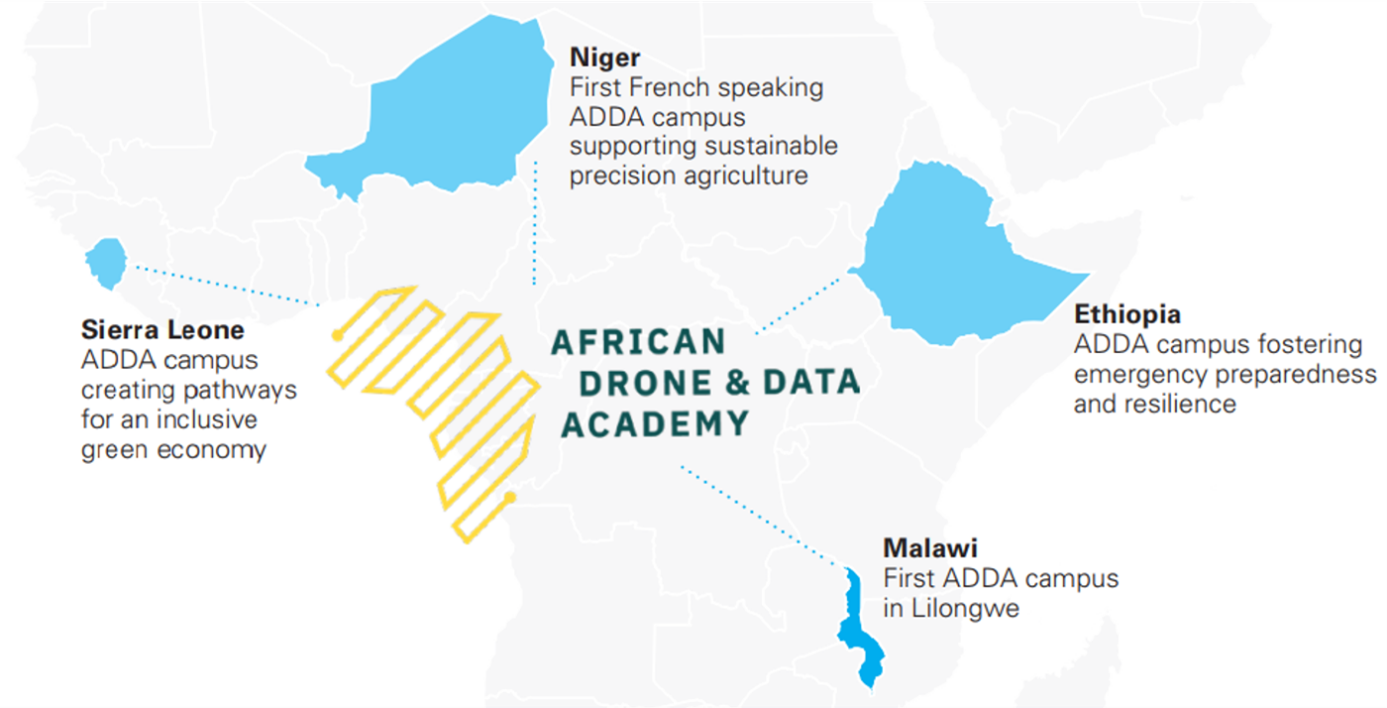Drone skills vital to African success

UNICEF drone academy brings hope, skills and economic strength to Africa.
How to accommodate drones in civil airspace is a hot topic in Europe and the United States. The challenge in these regions is to build on existing air traffic management processes to house this new technology safely.
In Africa, however, drones are a leapfrog technology and so have fewer constraints and even greater potential. “Drones are essential to a continent that has poor road and rail connectivity and any number of otherwise inaccessible communities,” says Michael Scheibenreif, Regional African Drone & Data Academy (ADDA) Manager for UNICEF. “Consider a young, pregnant woman needing essential medicines. Drones can deliver those medicines in hours rather than days or even weeks. Or they can collect a sample from a sick child and make all the difference in a swift diagnosis.”
Drone imagery is also crucial to supporting African communities, facilitating an array of improvements in agriculture, crisis planning, and overall logistical and communication efficiency.
UNICEF – which works to improve the lives of young mothers and children – saw further potential. Addressing the skills gap in drone pilotage would enable young people to gain qualifications, have well paid jobs, and so boost local economies.
The ADDA curriculum has won awards for its rigor and depth. For the core curriculum, in just 11 weeks students complete the equivalent of a one-semester university course in the US.
The academy offers young people the chance to certify as AUVSI TOP level 1 and 2 operators and helps them gain their remote pilot licenses (RPL), including flight operations, radio telephony, and regulation.
At ADDA Malawi, students build three different drones during the in-person course and also learn how to analyse the drone acquired imagery to support precision agriculture, flood preparedness, disaster response and much more. These qualifications enable young people to access employment paths that were usually reserved for expatriates from the northern hemisphere.
For Scheibenreif, the project has suggested a few key areas that ANSPs and regulators should consider when looking at their drone strategy.
The first is ensuring there is a difference between a recreational and professional license. Professional drones have capabilities well beyond an off the shelf product. Some have wingspans of two metres or more and can fly in excess of 100mph. That level of performance needs professional piloting techniques.
Another consideration is whether to employ integrated or separate airspace for drone use. The decision is crucial and will inform how a country sets up its overall air traffic management system.
The level of regulation also needs to be explored. If it’s too rigid a country could be miss out on a host of logistical efficiencies and resultant economic growth. But a lack of regulation is no help either and could affect safety and, therefore, overall demand for drone services
“There is increasing attention on drones and trained pilots make a real difference from the safety point of view,” Scheibenreif concludes. “The economic perspective cannot be downplayed either. This is a skilled job that will not only facilitate vital services in developing countries but also kickstart an important and prosperous sector that would have an enormous knock-on impact across the entire national economy.”
Drone lessons
In 2020, UNICEF founded the African Drone and Data Academy (ADDA) with support from the European Union and the German Federal Ministry for Economic Cooperation and Development (BMZ).
ADDA provides qualified pilots to meet the demand for drone-enabled services. To date, more than 700 young people have been trained through the scholarship programme and more than 60% of graduates from the core programme are women.
“There is a huge demand for places,” says Scheibenreif. “The young are so eager to learn and establish a rewarding career in a sector that would provide huge benefits to their communities. UNICEF covers full scholarship costs and from our original academy in Malawi, we are expanding into Ethiopia, Niger and Sierra Leone.”
In fact, the next stage of development has already taken place in Malawi, where the academy has transitioned to become an approved training organisation (ATO). This helps with civil aviation authority oversight and ensures the ATO meets all relevant standards and regulations. The aim is to have the ATO generate its own revenue to maintain its staff of instructors, administrators and accreditation status.
In the coming years, ATO status will be pursued in other African countries and academy opportunities will be explored in Asia and South America.
CANSO fully supports UNICEF in this endeavour to promote the positive use of drones in Africa. “CANSO is proud to support UNICEF and fully endorses the ADDA curriculum and its safety management system (SMS) as a global gold standard for remote pilot licenses,” says Simon Hocquard, CANSO’s Director General. Indeed, CANSO is helping in the creation of content for the ADDA courses and contributes to the ADDA programme syllabus. Individual ANSPs will also be asked to get involved.
“This is primarily about giving young people skills, but we are gaining a lot of experience about drone operation,” says Scheibenreif. “So, the chance to learn goes both ways. ADDA would thus like to extend its collaboration with ANSPs in the global north.”
African Drone and Data Academy
“The young are so eager to learn and establish a rewarding career in a sector that would provide huge benefits to their communities. UNICEF covers full scholarship costs and from our original academy in Malawi, we are expanding into Ethiopia, Niger and Sierra Leone.”




